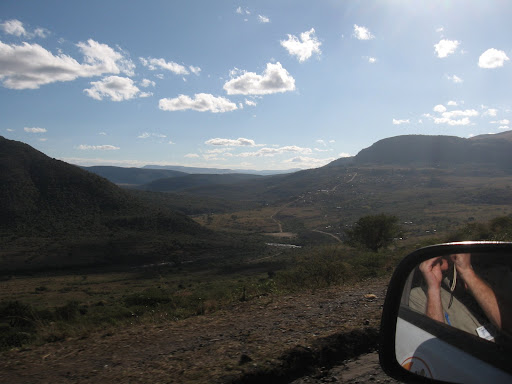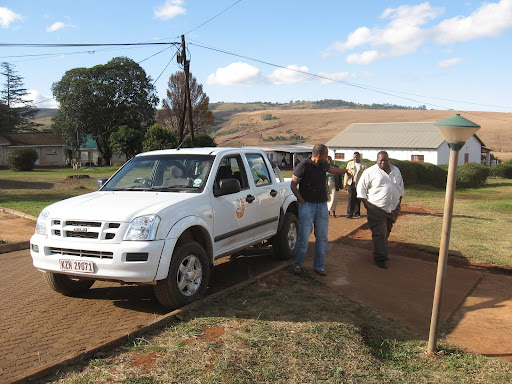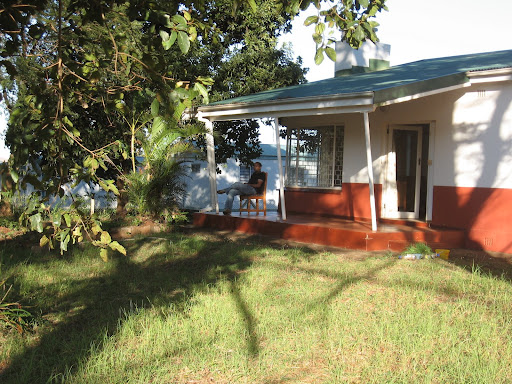I am woken with a jolt. The 4-wheel drive has left the tarmac and we are on dirt road. I look ahead into the hills – the road wends its way high up into the distance.
“How far?” I ask Amos, our driver.
“About 40km.” I settle back and watch as the settlements become less and less pseudo-bungalows and more and more mud rondavels.
It was about a month ago that our medical manager first mentioned that we had been asked to help out at Ceza Hospital – a remote rural hospital about 2 hours away. Its medical staff (only 8 at the best of times) had been steadily departing and only one remained. He was leaving at the end of May and they were desperate. Desperate enough to accept help from us.
As I said – a month ago – but it was only last Thursday that I found myself agreeing to go. Two of the others had been that week. I phoned them to ask what it was like.
“There are no words to describe it,” said Nomfundo, “speak to Dr Kekana.” Dr Kekana comes on the line and after humming and hah-ing agrees. There are no words to describe it.
“You cannot hear – you can only see it.”
It was not encouraging. On Sunday night I texted Nomfundo. Was there anything I needed?
“GOOD LUCK – YOU WILL NEED THAT” came the reply a few minutes later. Great.
The transport from Ceza arrived at our OPD Monday at 11am. We load our bags and set off.
“How is Ceza?” I ask Amos.
“It is nice – but we have no doctor and a hospital with no doctor is not a hospital.”
The road from Hlabisa is tarmac for 15km and then turns to dirt. 20km later it is tarmac again as we enter the town of Nongoma. Amos tells us this is the nearest Spar so we stop for provisions. 30km out of Nongoma we turn off and hit dirt once again.
The hills get steeper and the road zig-zags up. The view is spectacular as I look out of the window to the valley below – peppered with small Zulu kraals and settlements. We arrive at the hospital and Amos takes us to meet the hospital manager. “Call me BB,” he tells us, and instantly organises us some lunch, thanks us effusively for coming and takes us to our accommodation. We are startled – a proper house. Hendy's startlement evolves to ecstatic delight at the discovery of hot water - something he has been without in his accomodation from the day he arrived a month ago.
We think we might like it here.
“How far?” I ask Amos, our driver.
“About 40km.” I settle back and watch as the settlements become less and less pseudo-bungalows and more and more mud rondavels.
It was about a month ago that our medical manager first mentioned that we had been asked to help out at Ceza Hospital – a remote rural hospital about 2 hours away. Its medical staff (only 8 at the best of times) had been steadily departing and only one remained. He was leaving at the end of May and they were desperate. Desperate enough to accept help from us.
As I said – a month ago – but it was only last Thursday that I found myself agreeing to go. Two of the others had been that week. I phoned them to ask what it was like.
“There are no words to describe it,” said Nomfundo, “speak to Dr Kekana.” Dr Kekana comes on the line and after humming and hah-ing agrees. There are no words to describe it.
“You cannot hear – you can only see it.”
It was not encouraging. On Sunday night I texted Nomfundo. Was there anything I needed?
“GOOD LUCK – YOU WILL NEED THAT” came the reply a few minutes later. Great.
The transport from Ceza arrived at our OPD Monday at 11am. We load our bags and set off.
“How is Ceza?” I ask Amos.
“It is nice – but we have no doctor and a hospital with no doctor is not a hospital.”
The road from Hlabisa is tarmac for 15km and then turns to dirt. 20km later it is tarmac again as we enter the town of Nongoma. Amos tells us this is the nearest Spar so we stop for provisions. 30km out of Nongoma we turn off and hit dirt once again.
The hills get steeper and the road zig-zags up. The view is spectacular as I look out of the window to the valley below – peppered with small Zulu kraals and settlements. We arrive at the hospital and Amos takes us to meet the hospital manager. “Call me BB,” he tells us, and instantly organises us some lunch, thanks us effusively for coming and takes us to our accommodation. We are startled – a proper house. Hendy's startlement evolves to ecstatic delight at the discovery of hot water - something he has been without in his accomodation from the day he arrived a month ago.
We think we might like it here.



Comments
Thank You
Iam student attending MBChB @ wITS Unniversity.I think these is a nice adventural story to my village hospital coz I am also from kwaCeza
NICCCCE ONE